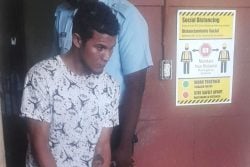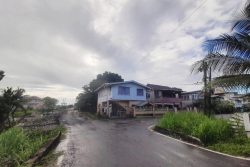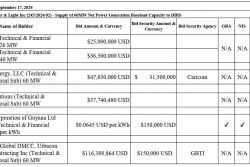The European Union (EU) Delegation here yesterday met with Minister of Health Dr Frank Anthony to discuss the upcoming EU Health and Pharmaceutical Investment Mission.
A release yesterday from the Ministry of Health said that discussions focused on opportunities for collaboration between the ministry and EU companies and aligning these efforts with Guyana’s healthcare needs.
Ambassador René van Nes and Joan Nadal from the EU Delegation and Taiana Mora, the mission coordinator and other members were present at the meeting.
In February this year, van Nes had said that through its flagship Global Gateway Initiative, the EU had added health as a main area of focus alongside forest protection in its assistance to this country and hoped to see Guyana in the near future producing pharmaceuticals to meet its own and regional and global needs.
“It fits with the bigger picture, the bigger policy objective of the government to really boost its health sector… For us this is a very important development. We have agreed that next to the forest sector, which is so far the only focal sector of the EU in Guyana, we will add another sector and that is the health sector,” he had said at a press conference.
“So from now on, the EU will not only work in forest but we will work in health. We will focus on pharmaceuticals, but of course we can probably do more, so of course we are talking to the Minister of Health and other government officials on what is the best way that we do this,” he added.
Last year, he had disclosed that the EU was helping to facilitate the possibility of Guyana, Barbados, and Rwanda, working together to engage in pharmaceutical production. van Nes pointed out that the EU had helped Rwanda set up its own pharmaceutical facility and if that can be mirrored in the Caribbean it would be excellent.
According to the Ambassador, the idea was first mooted by Barbadian Prime Minister Mia Mottley and President Irfaan Ali and they also initiated a discussion “where they said they wanted to look at producing pharmaceuticals in Barbados and Guyana.”
He said that currently, “We actually have people that are coming up and down. We have experts who already came to Guyana to look at possibilities.”
During COVID, developing countries faced major setbacks in accessing vaccines for their respective citizens because these were grabbed up by developed states.
“After COVID the realisation was very clear, that yes, you can help these countries by giving them the vaccines, but it’s even better to help them with setting up their own production facility so that they can make their own vaccines. That is what the EU has done in Rwanda,” he stated.
However, he pointed out that while many countries may want to be pharmaceutical producers, this requires stringent global regulations.
“The first thing if you want to make vaccines is to have a regulatory environment because you don’t want to buy medicine that is produced in a country where it isn’t entirely clear how that whole regulation works”, he said.
“So any company that wants to invest in a country will ask for a regulatory environment. We will assist. We are already doing that; having that regulatory environment. And in the meantime, we are talking to the European private sector to make sure that is done in a way that they appreciate. The whole notion is, that Guyana can attract the EU private sector to start the manufacturing of pharmaceuticals here.”





